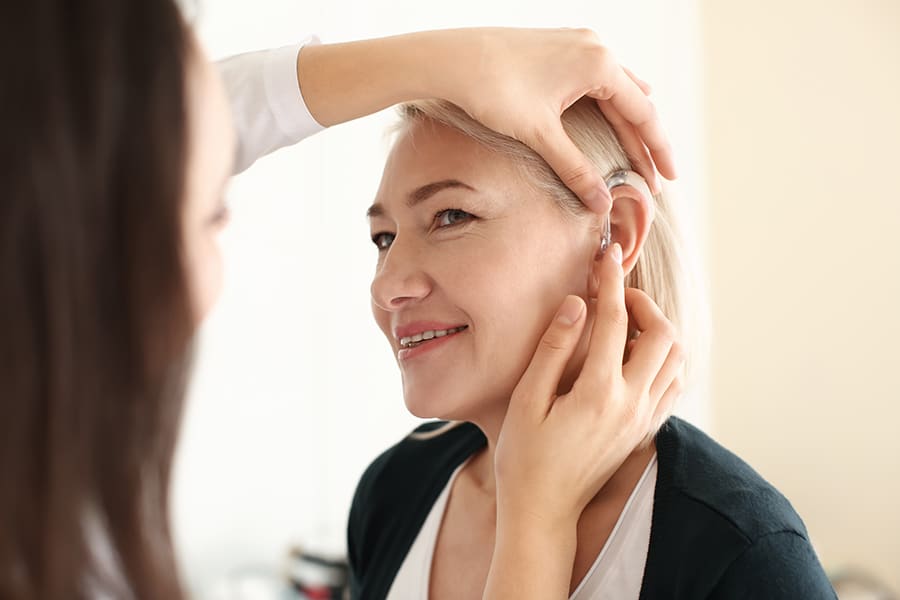Adriana Aleksandrova, Content Writer and Consultant for Hear4U, explores the role of hearing aids in dementia prevention. The article discusses the need for dismantling the stigma around hearing aids to improve the cognitive health and overall quality of life of individuals with hearing loss.
Hearing loss is a prevalent condition that affects millions of people worldwide, and its impact goes beyond just difficulties in hearing. Recent research has shed light on a surprising connection between untreated hearing loss and dementia, with hearing difficulties being identified as a potentially modifiable risk factor for cognitive decline.
However, despite the availability of hearing aids as an effective treatment for the condition, many people still hesitate to use them due to lingering stigma. This highlights the critical role of addressing and dismantling the misconceptions associated with hearing aids in promoting better cognitive health and overall well-being for individuals who are hard of hearing.
The link between hearing loss and dementia
The link between hearing loss and dementia has been established by a growing body of research. A report published in The Lancet in 2020 identified hearing loss as one of 12 key risk factors for dementia that are possibly modifiable, meaning that they can be changed to reduce dementia risk. The review suggested that one in three cases of dementia could be prevented if more people took care of their health throughout their lives.
Research has found that hearing loss can have a significant impact on cognitive health. When hearing loss is left unaddressed, it can lead to reduced auditory input to the brain, leading to changes in neural pathways and increased cognitive load, which can contribute to cognitive decline over time. Studies have also shown that hearing loss is associated with social isolation, depression, and a higher risk of falls, all of which are additional risk factors for dementia.
Of particular significance is the finding that contributions to the risk of dementia begin early and continue throughout life. This underscores the importance of addressing hearing loss as early as possible to reduce the risk of cognitive decline later in life. It also suggests that taking proactive measures to prevent or manage hearing loss, such as using hearing aids, may have a significant impact on dementia prevention.
Furthermore, hearing loss can have a profound impact on an individual’s quality of life, including communication difficulties, reduced social engagement, and decreased overall well-being. It can also affect relationships, employment opportunities, and mental health. By addressing hearing loss, not only can the risk of dementia be potentially reduced, but individuals can also improve their overall quality of life.
The role of hearing aids in preventing cognitive decline
Emerging evidence suggests that addressing hearing loss, particularly in mid-life, may play a crucial role in preventing cognitive decline and reducing the risk of dementia. A recent study published in The Lancet Public Health journal, which analysed data from 437,704 participants in the UK Biobank database, sheds light on the potential benefits of hearing aid use in mitigating the impact of hearing loss on cognitive health.
The study found that among the participants with hearing loss, those who did not use hearing aids had a 42 percent higher risk of all-cause dementia compared to participants with normal hearing. In contrast, no increased risk of dementia was found in people with hearing loss who used hearing aids.
These findings suggest that hearing aid use may be associated with a reduced risk of dementia in individuals with hearing loss, similar to those without the condition. Dr. Dongshan Zhu, the corresponding author of the study and a professor at Shandong University, has stated: “Our study provides the best evidence to date to suggest that hearing aids could be a minimally invasive, cost-effective treatment to mitigate the potential impact of hearing loss on dementia.”

The realities of hearing loss and the perception of hearing aids
A study conducted by Margaret Wallhagen, Ph.D. found that hearing loss stigma is strongly associated with ‘feelings of altered self-perception’. This includes perceptions of being ‘abled’ versus ‘disabled’ and ‘smart’ versus ‘cognitively impaired’. These altered self-perceptions can lead to procrastination when it comes to seeking treatment for hearing loss, as individuals may be hesitant to accept their condition and the need for hearing aids due to negative associations with their self-identity.
Furthermore, the stigma associated with hearing loss can also be linked to ageism and vanity. Many seniors may feel self-conscious about ‘looking old’ or being perceived as such by wearing hearing aids, which can lead to reluctance in using them. This issue is still prevalent in society, as individuals with hearing loss are reportedly perceived as ‘old’, ‘cognitively diminished’, ‘poor communication partners’, and ‘uninteresting’.
Survey data reveals that when asked why they don’t wear hearing aids, people with hearing loss often cite stigmatising reasons, such as being ‘too embarrassed’, fearing that it ‘makes them look disabled’, or worrying about being made fun of by others. These perceptions and concerns can contribute to the negative stigma associated with hearing aids and further discourage individuals with hearing loss from seeking and using these beneficial devices.
Addressing and breaking down the stigma associated with hearing loss and hearing aids is crucial to encourage individuals to seek appropriate treatment and support for their hearing loss. Promoting awareness, education, and advocacy around hearing loss and hearing aids can help to dispel misconceptions and negative perceptions and can also play a role in reducing the risk of dementia in adults and seniors with this condition. It is important to emphasise the benefits of hearing aids in improving communication, cognitive function, and overall quality of life. By reducing the stigma associated with wearing hearing aids, individuals may feel more comfortable seeking help and using hearing aids, which can potentially mitigate the impact of hearing loss on cognitive health.
Confronting the stigma
Reducing and eliminating the stigma associated with hearing aids is crucial to empower individuals with hearing loss to seek appropriate treatment and support, and to improve their overall quality of life.
Promoting education and awareness about hearing loss and hearing aids can help dispel misconceptions and negative perceptions. This can include providing accurate information about the prevalence of hearing loss, its impact on daily life, the benefits of hearing aids, and the importance of seeking timely treatment. Education can be targeted towards individuals who are hard of hearing, their families, healthcare providers, and the general public through various channels such as public health campaigns, community events, and online resources.
Advocating for individuals with hearing loss and creating supportive environments can also help reduce stigma. This can involve advocating for inclusive policies and practices in public spaces, workplaces, and social settings to ensure that individuals with hearing loss have equal access to communication and participation. Providing support groups, counselling, and peer-to-peer mentoring can also help those who are hard of hearing connect with others who share similar experiences and provide emotional support, thus reducing feelings of isolation and stigma.
Positive representations of people with hearing aids in the media, literature, and other forms of communication can help challenge stereotypes and promote acceptance. Highlighting successful individuals with hearing loss who use hearing aids, and showcasing their achievements and contributions, can help shift societal attitudes towards a more positive and inclusive perspective.
The use of positive and empowering language when discussing hearing loss and hearing aids can play a significant role in reducing stigma. Avoiding negative labels that imply a deficit or an impediment and instead using person-centred language that focuses on the individual’s abilities and strengths can help reshape perceptions and reduce the sense of shame or embarrassment associated with hearing loss and hearing aids.
Normalising the use of hearing aids as a common and accepted solution for hearing loss is another essential aspect of reducing stigma. This can involve portraying the devices as a normal part of the aging process or as a common medical device, similar to the use of glasses for vision correction. By normalising the use of hearing aids, individuals may feel less self-conscious and more willing to seek help and use hearing aids without fear of judgment or social repercussions.

Conclusion
Addressing and confronting the stigma associated with hearing loss and hearing aids is now more crucial than ever, especially in light of recent research that highlights the potential benefits of hearing aids in reducing the risk of dementia in individuals with hearing loss. By promoting education, awareness, advocacy, and normalisation, we can work towards dispelling misconceptions and negative perceptions about hearing loss and hearing aids and encourage individuals to seek appropriate treatment and support for this condition. When they feel empowered to use hearing aids without fear of stigma, they can experience improved communication, cognitive function, and overall quality of life.
It is vital for healthcare providers, communities, and society as a whole to actively confront and reduce the stigma related to hearing loss and hearing aids and create inclusive environments that promote acceptance and understanding. By doing so, we can help people who are hard of hearing lead healthy, fulfilling lives, and potentially reduce the risk of dementia in society. Let us strive to create a world where hearing loss is understood, accepted, and supported, and where individuals with hearing loss can thrive and maintain optimal cognitive health in their golden years.
Related



